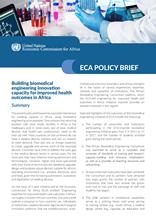Building biomedical engineering innovation capacity for improved health outcomes in Africa

The present policy brief examines a possible mechanism for building capacity in Africa, using biomedical engineering as an example. One common but recurring problem with most health facilities in Africa is the inadequacy and, in some cases, lack of basic medical devices that health-care professionals need to do their job well. Most countries on the continent do not have a medical devices industry and rely on imports to meet demand. They also rely on foreign expertise to install, upgrade and service most of the imported devices. Countries have tried to address the skills gap in the medical devices sector in various ways. For the most part, they have relied on training technicians and technologists. However, higher and more specialized skills than those of technicians are needed to upgrade, design and produce robust devices suitable for Africa’s operating environment (i.e., unstable electricity, dust and heat), given the increasing automation, complexity and digitization of medical devices. On the basis of a pilot initiative led by the Economic Commission for Africa (ECA) entitled “Engineering expertise for improved healthcare outcomes in Africa”, run largely in Eastern African countries, this policy brief outlines a proposal on how countries can, individually or collectively, establish dynamic regional technological innovation platforms that are multidisciplinary, multi-institutional and cross-boundary, and whose strengths lie in the fusion of various experiences, expertise, interests and capacities of institutions. The African Biomedical Engineering Consortium platform, which the ECA-led engineering for improved health-care outcomes in Africa initiative inspired, provides an excellent example in this regard.